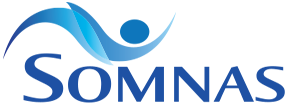WHAT TO EXPECT FROM YOUR SLEEP STUDY
A sleep study monitors your brain waves, breathing, heart rate and body movements while you sleep overnight. It is performed in a sleep center by a trained sleep technologist, who monitors your study while ensuring your safety and comfort. The results of your sleep study will enable your doctor to correctly diagnose your sleep disorder or determine that your sleep is normal.
On the day of the study, you will be asked to arrive at the sleep center in the evening. The technologist will attach sensors to your head, chin, chest and legs. You also will wear soft belts around your chest and stomach. An oxygen monitor will be clipped on your finger. Some centers may use a microphone to measure snoring. A video camera will record the sleep study to ensure your safety.
You will then be allowed to fall asleep while the technologist monitors your sleep parameters on a computer. The technologist may wake you up in the middle of the night to ask you to change your body position or to replace wires if they come loose.
Your doctor may have ordered a “split-night study” if you are at risk for obstructive sleep apnea. If you show clear signs of sleep apnea during the first half of the study, then the technologist may apply Continuous Positive Airway Pressure (CPAP) therapy during the second half of the night. CPAP provides air pressure through a mask that opens the upper airway during sleep.
After you wake up in the morning, the technologist will help remove the sensors, belts and oxygen monitor. The data from the study will be reviewed by a boardcertifed sleep medicine physician, who will make a diagnosis.

Before Arriving:
FREQUENTLY ASKED QUESTIONS
Is the sleep study painful?
What if I can’t fall asleep?
Is a family member or friend allowed to stay with me?
Will I be able to use the restroom during the study?
Should I bring my nighttime medications with me?
Can I sleep in a recliner?
Can I have the television on?
Is the bed comfortable?
What if I can’t tolerate the CPAP mask?
How will I know the results of the sleep study?
ACKNOWLEDGEMENT: CONTENT DEVELOPED BY THE AMERICAN ACADEMY OF SLEEP MEDICINE
QUESTIONS ABOUT A SLEEP ISSUE? LET’S TALK.
Imtiaz Ahmad, MD, MPH, FCCP
Dr. Imtiaz Ahmad is a highly qualified physician, Board Certified in Pulmonary and Sleep Medicine. He has received advanced training from some of the most prestigious institutions, including Harvard University, Cornell University, State University of New York at Brooklyn, and the University of Mississippi. SOMNAS is a medical facility that is committed to improving and maintaining the health of patients with sleep disorders. The expert team at SOMNAS is known for their compassionate and high-quality care. They offer unparalleled treatment and care to patients on the Gulf Coast of Florida, ensuring a better and healthier life for them.
Job Title: Board Certified in Pulmonary Medicine



